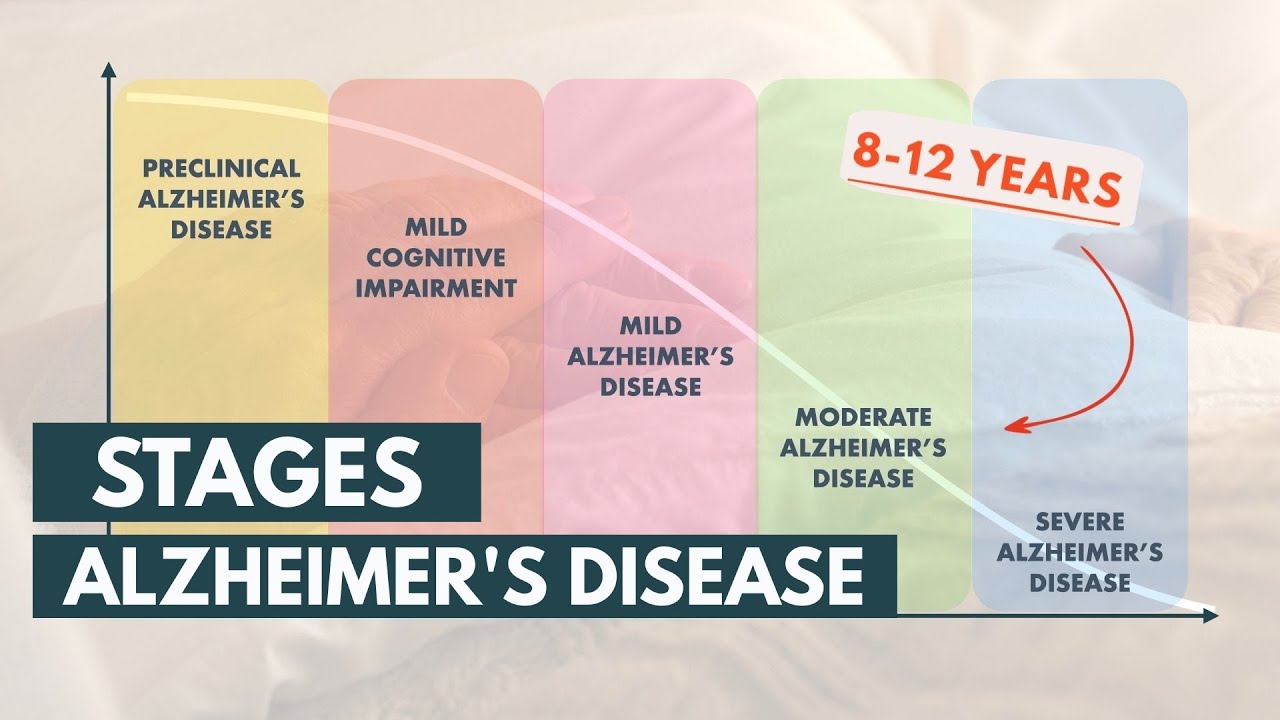How does someone die from Dementia
Summary
TLDRThis video explains the progression of dementia, including Alzheimer's and Parkinson's, highlighting its unique 'staircase decline' pattern compared to other diseases. The speaker discusses common causes of rapid health decline in dementia patients, such as falls and infections like UTIs and aspiration pneumonia. The narrative then shifts to the end stages of dementia, describing them as generally peaceful, with patients often becoming less agitated and more restful. Care tips for loved ones, including cleanliness, safety, and comfort, are emphasized, alongside advice on preventing skin breakdown and supporting caregivers by offering help and respite.
Takeaways
- 📚 Dementia, including Alzheimer's and Parkinson's, progresses in a 'staircase decline' with periods of stability followed by sudden deteriorations often triggered by falls or infections.
- 🦠 Infections such as UTIs (urinary tract infections) and aspiration pneumonia are common causes of sudden health declines in dementia patients.
- 🚨 Fall prevention and infection control are crucial in managing the health of someone with dementia, aiming to maintain cleanliness and safety.
- 😷 Many with dementia eventually experience a gradual progression where they stop eating and drinking, leading to a natural death phase.
- 💤 The end-of-life stage for dementia patients is often peaceful, characterized by increased sleep and a decrease in confusion and restlessness.
- 🚑 Caregivers should focus on keeping the dementia patient clean, safe, and comfortable as primary goals of care.
- 📚 Skin breakdown and pressure wounds are common in later stages due to prolonged bed rest, requiring vigilant care and prevention efforts.
- 🤦 Regularly checking for signs of skin issues, such as redness or pressure sores, and repositioning the patient can help prevent further damage.
- 🙌 Offering support to caregivers, such as giving them breaks or assisting with patient care, is a valuable form of help.
- 💻 Accepting help from others is crucial for caregivers to maintain their own well-being and continue providing effective care.
Q & A
What are the common causes of death in individuals with dementia?
-Common causes of death in individuals with dementia include infections like urinary tract infections (UTIs) and aspiration pneumonia, or a gradual progression of the disease leading to a natural death characterized by cessation of eating and drinking.
How does dementia progression differ from cancer progression?
-Dementia progression is often described as a staircase decline, where patients experience a decline to a new plateau after an event like a fall or infection, unlike the steep decline observed in many types of cancer.
What are the key preventive measures for individuals with dementia?
-Key preventive measures include fall prevention and infection prevention, focusing on keeping the individual clean and safe.
What happens during the actively dying phase of dementia?
-During the actively dying phase of dementia, individuals often experience a very peaceful period characterized by mostly sleeping and not eating or drinking.
Why is confusion and agitation less common in the final stages of dementia?
-Confusion, agitation, and restlessness, common in the early stages of dementia, are usually not present in the final stages. In the end, individuals are typically more peaceful and sleep more.
What is the caregiver's role in the late stages of dementia?
-The caregiver's role in the late stages of dementia is to ensure their loved one is clean, safe, and comfortable, focusing on basic needs and comfort care.
Why might individuals with dementia become bed bound, and what are the consequences?
-Individuals with dementia might become bed bound due to the severe debilitation caused by the disease's progression, leading to potential skin breakdown and pressure wounds due to constant pressure on certain body parts.
How can caregivers prevent skin breakdown in bed bound dementia patients?
-Caregivers can prevent skin breakdown by regularly checking for redness, turning the patient to relieve pressure points, and using pillows to float the heels and other strategies to minimize pressure on vulnerable areas.
How can people support caregivers of individuals with dementia?
-People can support caregivers by offering breaks, providing companionship to the patient, and bringing necessities like food or coffee to the caregiver, as well as encouraging caregivers to accept help.
What should caregivers do if they notice early signs of skin breakdown in their loved ones?
-If early signs of skin breakdown are noticed, such as redness on pressure points, caregivers should monitor the area closely and adjust the patient's position regularly to alleviate pressure and prevent further damage.
Outlines

This section is available to paid users only. Please upgrade to access this part.
Upgrade NowMindmap

This section is available to paid users only. Please upgrade to access this part.
Upgrade NowKeywords

This section is available to paid users only. Please upgrade to access this part.
Upgrade NowHighlights

This section is available to paid users only. Please upgrade to access this part.
Upgrade NowTranscripts

This section is available to paid users only. Please upgrade to access this part.
Upgrade NowBrowse More Related Video

Pengertian dan Jenis-jenis Demensia

Alzheimer's disease - plaques, tangles, causes, symptoms & pathology

Stages and Life Expectancy of Alzheimer's Disease

How Donepezil works in Alzheimer's disease | Mechanism and side effects

Alzheimerova choroba - demence

Какое лекарство облегчает симптомы множества болезней?
5.0 / 5 (0 votes)